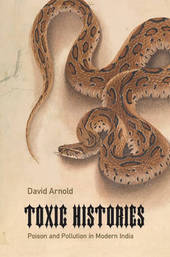
|
Toxic Histories: Poison and Pollution in Modern India
Hardback
Main Details
| Title |
Toxic Histories: Poison and Pollution in Modern India
|
| Authors and Contributors |
By (author) David Arnold
|
| Series | Science in History |
|---|
| Physical Properties |
| Format:Hardback | | Pages:250 | | Dimensions(mm): Height 237,Width 159 |
|
| Category/Genre | Asian and Middle Eastern history
Pollution and threats to the environment |
|---|
| ISBN/Barcode |
9781107126978
|
| Classifications | Dewey:363.730954 |
|---|
| Audience | | Professional & Vocational | |
|---|
| Illustrations |
8 Halftones, unspecified
|
|
Publishing Details |
| Publisher |
Cambridge University Press
|
| Imprint |
Cambridge University Press
|
| Publication Date |
15 February 2016 |
| Publication Country |
United Kingdom
|
Description
Toxic Histories combines social, scientific, medical and environmental history to demonstrate the critical importance of poison and pollution to colonial governance, scientific authority and public anxiety in India between the 1830s and 1950s. Against the background of India's 'poison culture' and periodic 'poison panics', David Arnold considers why many familiar substances came to be regarded under colonialism as dangerous poisons. As well as the criminal uses of poison, Toxic Histories shows how European and Indian scientists were instrumental in creating a distinctive system of forensic toxicology and medical jurisprudence designed for Indian needs and conditions, and how local, as well as universal, poison knowledge could serve constructive scientific and medical purposes. Arnold reflects on how the 'fear of a poisoned world' spilt over into concerns about contamination and pollution, giving ideas of toxicity a wider social and political significance that has continued into India's postcolonial era.
Author Biography
David Arnold is Emeritus Professor of History at the University of Warwick, and previously taught at the University of Dar es Salaam, the University of Lancaster, and the School of Oriental and African Studies, University of London. A founder member of the Subaltern Studies group, he has been a visiting professor in Chicago and Zurich, and is a Fellow of the British Academy. His published work includes Colonizing the Body: State Medicine and Epidemic Disease in Nineteenth-Century India; Science, Technology and Medicine in Colonial India; Gandhi; The Tropics and the Traveling Gaze: India, Landscape, and Science, 1800-1856, and Everyday Technology: Machines and the Making of India's Modernity.
Reviews'In this meticulous toxicological assay of British India, David Arnold challenges us to rethink how we draw boundaries between the therapeutic and the poisonous, between purity and danger, and between European and Indigenous. Colonialism is refigured as the governance of poisons - and modernity turns into the titrating of toxicities. A revealing forensic study of poison as substance and metaphor under colonial rule, Toxic Histories also shows us how - and why - toxicity became a concept intrinsic to India's modernity. Thus Arnold traces the sad genealogy of our poisoned world.' Warwick Anderson, University of Sydney 'The idea of poison lurks below the surface of much of Indian history but it has rarely been investigated in its own right. In this path-breaking book, David Arnold demonstrates the importance of doing so. Exploring the practical uses and the ideological significance of poisons, Arnold shows how narratives of toxicity became central to the construction and evaluation of India's modernity. Brimming with fascinating insights, there is scarcely any aspect of Indian history which is not illuminated by this book.' Mark Harrison, University of Oxford 'Against the vast backdrop of India's pre-, colonial and post-colonial history, the eminent historian David Arnold asks the provocative question: do different places have their own toxic histories? In an outstanding display of scholarship, in equal measures subtle and sophisticated, full of striking and illuminating historical examples, and written with a clear sense of how his analysis might engage with critical understandings of our own toxic present, Arnold's answer is a satisfyingly complex 'yes'.' Ian Burney, University of Manchester 'Arnold's explorations of poison, pollution, and toxicity are accessible, informative, and quite illuminating ... The book does serve as a helpful road map to future scholarship on poison and environmental pollution not only in India but in the rest of our poisoned world.' Eric Strahorn, Environmental History
|